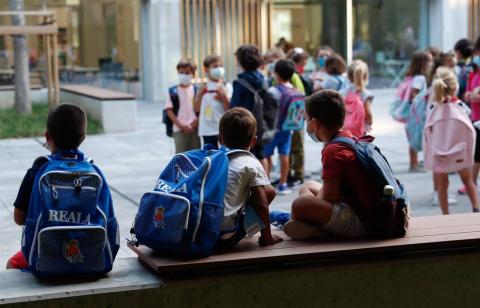Reaction to study looking at neurodevelopment of children born in first year of pandemic
A systematic review and meta-analysis published in JAMA Network Open examines whether there is an association between newborn exposure to SARS-CoV-2 and impaired neurodevelopment compared to those born before the pandemic. Neurodevelopment in the first year of life was not modified by being born or growing up during the covid-19 pandemic or by gestational exposure to SARS-CoV-2. However, the authors appreciated that, regardless of whether maternal infection was present, the pandemic was associated with a risk of delayed communication in these infants.

Llorenç Andreu - niños
Llorenç Andreu
Co-director of the Cognition and Language Research Group
A meta-analysis study published in JAMA Network Open shows that children born during the pandemic have impaired communication development by the age of one year, but not in other areas of neurodevelopment. It will be very important to continue to study this cohort of children to assess whether they have a higher incidence of language development disorder in childhood, the prevalence of which is estimated at 7.5%.
It is a good study that includes a systematic review of 8 studies and a meta-analysis of 5 articles. The procedure followed for the study is very rigorous (the study was registered in PROSPERO; it has followed the PRISMA guidelines; 1210 articles representing a sample of 21 419 babies have been analysed).
This article includes a systematic review and meta-analysis, thus reviewing previous studies that have looked at the risk of neurodevelopmental impairment in both children whose mothers were infected with SARS-CoV-2 during gestation and infants born during the pandemic. The results show that, at one year of age, children raised in the pandemic are more likely to have communication problems. Those whose mothers were infected with SARS-CoV-2 during gestation had lower values for fine motor skills.
The main implication is that, at one year of age, pandemic-born children do not have higher values for neurodevelopmental impairment than children born in earlier years, except in the area of communication development.
The article reviews studies in which children's development was assessed at the age of 12 months using the ASQ-3 Ages and Stages Questionnaires test. However, to analyse the real impact on neurodevelopment in children born during the pandemic, we will have to wait until the cohort of children born during the pandemic is older to be able to analyse whether the incidence of neurodevelopmental disorders is higher in these children, since the different neurodevelopmental disorders are detected during childhood (some, such as autism, are detected around the age of two years, others, such as developmental neurodevelopmental disorder (DDD), are detected around the age of three years, and some are detected around the age of three years); others, such as language development disorder, at around 5 years of age; and still others, such as learning disorders, are diagnosed at around 7-8 years of age).
Quique Bassat - nacidos pandemia EN
Quique Bassat
Director General and ICREA Research Professor at the Barcelona Institute for Global Health (ISGlobal)
Systematic reviews and meta-analyses produce high quality scientific evidence and, in this case, this study confirms the low impact of maternal SARS-CoV-2 infections on neonatal health and subsequent neurocognitive development of infants born to mothers exposed or infected by this virus.
The only notable difference found is in speech development during the first year of life, attributable more to the indirect consequences of the pandemic - isolation, parental stress, etc. - than to the direct effect of the virus.
Kamran Hessami et al.
- Research article
- Peer reviewed
- People
- Systematic review
- Meta-analysis



